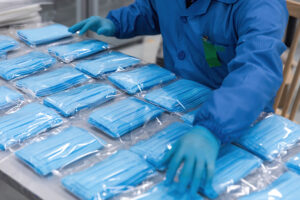About £10 billion of spending on PPE has been written off by the government, as auditors rebuke the health department for its management of taxpayers’ cash during the pandemic.
Hundreds of millions were wasted on unusable equipment and supplies that have passed their expiry date, while taxpayers had to pay billions over the odds in the scramble for masks and gowns at the start of the pandemic.
Officials are also unsure of the location of a further £3.6 billion in supplies, the National Audit Office (NAO) said, offering only qualified approval to the Department of Health and Social Care accounts.
Gareth Davies, head of the NAO, said that Covid buying had significantly increased the risk of fraud and that officials have not provided “adequate assurance that the level of fraud losses are not material”.
He said that accounting for the Department of Health’s spending during the pandemic has been “challenging”, and delayed publication of 2020-21 accounts until this week.
The accounts showed that £8.7 billion of the £12.1 billion spent on PPE in the early phases of the pandemic has been written off. This includes £670 million of “defective” equipment found to be totally unusable, £2.6 billion on supplies “not suitable” for the NHS, for which officials are trying to find other uses, and £750 million on PPE that has passed its expiry date.
In addition, £4.7 billion has been written off the value of remaining stocks because the market price is now so much lower than what the government paid. For example, the government paid three times as much for aprons as they are now worth.
The wasted money is more than the entire Ministry of Justice budget, about 7 per cent of NHS running costs, or enough to build more than a dozen new hospitals.
A further £1.2 billion is being written down on advance orders delivered this financial year that are now worth less than the government paid for them.
But ministers have insisted that paying a premium to protect NHS workers in the early days of the pandemic was entirely justified, as they were accused of “criminal” levels of waste.
The government has faced persistent criticism throughout the pandemic over errors, waste and a lack of transparency, while spending more than £17 billion on PPE, including contracts handed out through a “VIP lane” for those with government contacts.
Davies found that the Department of Health had “rapidly increased its risk appetite and adapted its normal processes” during the pandemic, but that it was “not able to manage adequately some of the elevated risks, resulting in significant losses for the taxpayer”.
The NAO said the department “did not maintain adequate records of the location or condition” of the unaccounted £3.6 billion worth of stock. Officials believe the department held 7.5 billion items in 16,000 containers at ports in the UK and a further 1.6 billion stored in China, but “is unable to confirm this”.
The government was also charged £111.5 million for not moving containers full of PPE from a port to their storage facility on time, while paying £649,000 in cancellation fees for delivery flights from China that were cancelled.
Test and Trace is likely to lose £195 million on items for which it has not found a “suitable use”, the accounts say.
The findings come after Lord Agnew of Oulton, the anti-fraud minister who had roles in the Cabinet Office and Treasury and who dramatically resigned at the dispatch box last week, accusing the government of failing to take pandemic fraud seriously, despite almost £30 billion of taxpayers’ money being stolen each year.
Pat McFadden, shadow chief secretary to the Treasury, said: “These levels of waste destroy any claim the Conservatives have to be careful stewards of the public finances. Along with the government’s laissez faire attitude to fraud, this will be particularly galling to hard-working households wondering how they will pay the higher taxes the chancellor is imposing this April.”
But ministers have argued they needed to move fast and were willing to pay more to ensure front line staff were protected as demand rocketed and prices rose early in the pandemic.
Downing Street last night stood by government spending. Boris Johnson’s spokesman said: “We were acting in a highly competitive global market with many countries imposing export bans and obviously we were seeking to secure PPE for front line clinicians.”
He said that paying higher prices was “justified because it was necessary to get those aprons and other important pieces of PPE to the front line”, saying that more UK manufacturing would avoid similar problems in the future.
In a written statement, Ed Argar, the health minister, acknowledged that there had been “huge inflation in price for goods and intense global competition to secure scarce supplies”, adding that the government will “make no apology for procuring PPE at pace”, even at the cost of overpaying.
“The risk that contracts might not perform and that supplies were priced at a premium needed to be balanced against the risk to the health of front line workers, the NHS and the public if we failed to get the PPE we so desperately needed,” he said.
The Department of Health said: “We have delivered over 17.5 billion items of PPE to the front line, with 97 per cent of PPE we ordered being suitable for use. The supply of these vital items helped keep our NHS open at a moment of national crisis.”
Read more:
Ministers write off £10bn on lost, unusable or overpriced PPE
















